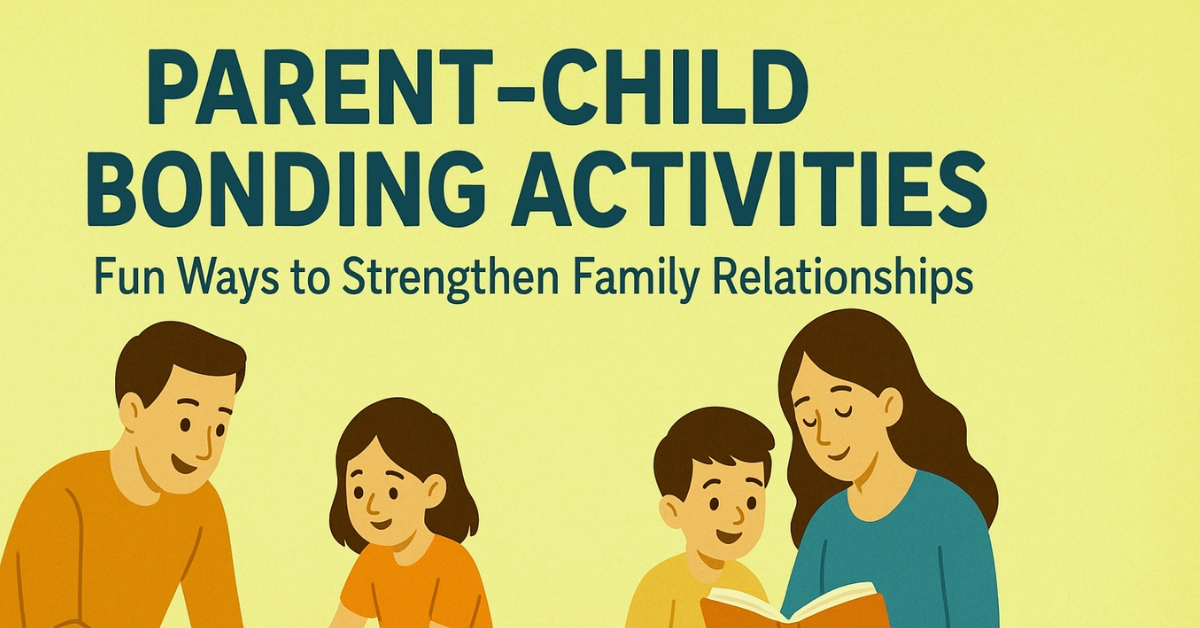Introduction
Building a strong parental relationship is the foundation of a happy family. Every parent dreams of raising children who feel loved, supported, and understood. But in today’s busy lifestyle, it’s easy to get caught up in routines and miss out on those special moments that truly matter. That’s where parent-child bonding activities play a vital role.
Spending meaningful time together doesn’t just bring joy—it shapes a child’s emotional, social, and psychological development. Whether it’s through fun family bonding activities, outdoor games, or simply sharing stories at bedtime, these moments create lasting memories.
In this blog, we’ll dive deep into:
- What child development and psychology mean in the context of parenting
- The top eight pillars of building a strong parent-child relationship
- Practical bonding tips every parent can use daily
So, let’s begin the journey toward stronger family connections.
Part One: What is Child Development and Psychology?
Child development and psychology are at the heart of creating strong family bonds. It’s not just about milestones like walking or talking, but also about emotional security, trust, and self-confidence.
When parents actively participate in their child’s development, it fosters a nurturing environment where kids feel safe to express themselves. Here are some core elements of child development that relate directly to bonding:
- Mutual Understanding: Parents who take time to understand their child’s emotions and perspectives build trust.
- Open Communication: Encouraging honest conversations helps children feel valued and heard.
- Consistent Support: Being present during both success and struggles reassures kids of unconditional love.
- Respect for Individuality: Recognizing that every child is unique allows them to grow into confident, independent individuals.
In simple terms, child psychology reminds us that quality time + emotional support = stronger relationships.
Top Eight Pillars of Parental Relationship
To create meaningful bonds, parents can follow eight strong pillars of connection:
1. Establishing Trust
Trust is the foundation of all relationships. When parents are consistent, honest, and reliable, children feel secure and confident in sharing their feelings.
2. Effective Communication
Communication is not only about talking but also about listening with empathy. Parents who engage in conversations at their child’s level foster deeper emotional connections.
3. Quality Time Together
Bonding requires presence over presents. Even simple daily routines, like cooking together or evening walks, strengthen parent-child relationships when done mindfully.
4. Respectful Boundaries
Setting healthy boundaries helps children learn responsibility and respect. For example, teaching them to value privacy encourages independence and mutual understanding.
5. Showing Empathy
Empathy means putting yourself in your child’s shoes. It’s about acknowledging their feelings, whether they’re happy, sad, or frustrated, and offering compassionate support.
6. Consistent Support and Guidance
Children thrive when they know their parents will always be there—whether they succeed or fail. This consistency builds resilience and confidence.
7. Encouraging Independence and Decision-Making
Letting kids make small choices (like picking clothes or choosing a hobby) gives them self-confidence and prepares them for bigger life decisions later.
8. Celebrating Individuality
Every child has unique talents, interests, and quirks. Parents who celebrate these differences boost their child’s self-esteem and deepen the bond.
Top Eight Tips for Building a Strong Bond Between Parent and Child
While the eight pillars form the foundation, parents also need practical tips they can apply daily. Here are eight powerful bonding tips:
1. Unconditional Love and Support
Love your child for who they are—not for what they achieve. A warm hug after a tough day or encouraging words during struggles give children a sense of safety and belonging.
2. Positive Reinforcement
Instead of focusing only on mistakes, praise their efforts. For example, say “I’m proud of how hard you tried” rather than just “Good job”. Positive reinforcement boosts confidence and motivation.
3. Shared Interests and Activities
Bonding becomes easier when you engage in fun parent-child activities like cooking, drawing, reading stories, or playing outdoor games. These activities create joyful memories that last a lifetime.
4. Handling Conflicts Constructively
Arguments are natural in any family. Instead of yelling or ignoring, teach your child how to resolve conflicts calmly. This not only strengthens your relationship but also teaches them lifelong problem-solving skills.
5. Encouraging Independence
Allow your child to make age-appropriate choices—like deciding what book to read or what game to play. Independence develops confidence, critical thinking, and responsibility.
6. Consistent Routines and Structure
Children feel safe when life is predictable. Simple routines like bedtime rituals or weekend family dinners provide security and reinforce togetherness.
7. Teach and Learn Together
Turn everyday life into learning opportunities. Planting a tree, cooking a new recipe, or solving puzzles together can encourage teamwork and mutual growth.
8. Be Present and Attentive
Put away distractions—especially screens—when spending time with your child. Eye contact, listening carefully, and engaging fully show them they are truly valued.
Conclusion
Building a strong parent-child bond is not a one-time effort—it’s a lifelong journey. By combining love, trust, quality time, and consistent support, you create a nurturing environment where children can thrive emotionally and psychologically.
Every game you play, every story you read, every walk you take—these little family bonding activities add up to priceless memories.
So, start today. Try one bonding activity this week, listen more, hug more, and celebrate your child’s individuality. Together, you’ll build a bond that lasts a lifetime.
👉 Now it’s your turn: What’s your favorite bonding activity with your child? Share your ideas in the comments to inspire other parents!




